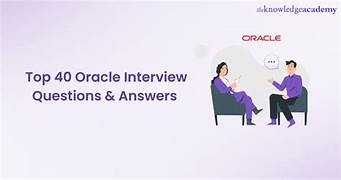Top 40 Oracle SQL Interview Questions and Answers: Your Guide to Success
Whether you’re a fresher trying to land your first job or a seasoned developer aiming to step into a new opportunity, Oracle SQL is a skill that often sits high on the priority list for IT interviews. Oracle is widely used in enterprises for managing databases, and recruiters look for professionals who are well-versed in its SQL features.
To help you confidently walk into your Oracle SQL interview, we’ve compiled the top 40 interview questions and answers that cover the basics, intermediate concepts, and some tricky queries often thrown in by hiring managers. Plus, we’ve added some handy tips to help you stand out.
Let’s dive right in!
🔹 Section 1: Basic Oracle SQL Interview Questions
1. What is Oracle SQL?
Oracle SQL is a structured query language used to interact with Oracle databases. It’s used for creating, modifying, and querying database objects like tables, views, and indexes.
2. What is the difference between SQL and PL/SQL?
SQL is a declarative language for querying and manipulating data, while PL/SQL is a procedural language that includes SQL and adds features like loops, conditions, and functions.
3. What are the different types of SQL statements?
- DDL (Data Definition Language): CREATE, ALTER, DROP
- DML (Data Manipulation Language): INSERT, UPDATE, DELETE
- DCL (Data Control Language): GRANT, REVOKE
- TCL (Transaction Control Language): COMMIT, ROLLBACK, SAVEPOINT
4. What is a primary key?
A primary key uniquely identifies each record in a table. It doesn’t allow NULL values and ensures uniqueness.
5. What is a foreign key?
A foreign key is a column that creates a relationship between two tables. It refers to the primary key in another table.
🔹 Section 2: Intermediate Oracle SQL Questions
6. What is a view?
A view is a virtual table based on a SELECT query. It doesn’t store data itself but provides a way to simplify complex queries.
7. Can you update a view?
Yes, but only if the view is based on a single table and doesn’t include group functions, DISTINCT, or joins.
8. What is a synonym in Oracle?
A synonym is an alias for a database object. It helps in simplifying access to long-named or remote objects.
9. What are constraints?
Constraints are rules applied to table columns to enforce data integrity. Examples include NOT NULL, UNIQUE, CHECK, PRIMARY KEY, and FOREIGN KEY.
10. What is the difference between DELETE and TRUNCATE?
- DELETE: Removes rows one by one, can be rolled back.
- TRUNCATE: Removes all rows at once, faster, cannot be rolled back.
11. What is the difference between CHAR and VARCHAR2?
- CHAR: Fixed-length. Pads with spaces.
- VARCHAR2: Variable-length. Stores only the entered characters.
12. What are indexes in Oracle SQL?
Indexes are used to speed up the retrieval of rows by using a pointer system. They can be B-tree (default) or bitmap.
13. What is the difference between a unique key and a primary key?
- Primary key: One per table, no NULLs allowed.
- Unique key: Multiple allowed, NULLs allowed.
14. How do you retrieve the top 5 salary earners from a table?
SELECT * FROM (
SELECT * FROM employees ORDER BY salary DESC
) WHERE ROWNUM <= 5;
15. What is ROWNUM in Oracle?
ROWNUM is a pseudo-column that assigns a number to each row returned by a query.
🔹 Section 3: Joins and Set Operations
16. What is a JOIN?
A JOIN is used to combine rows from two or more tables based on related columns.
17. Types of JOINS in Oracle SQL?
- INNER JOIN: Returns matching rows.
- LEFT OUTER JOIN: All rows from the left table + matching from the right.
- RIGHT OUTER JOIN: All rows from the right table + matching from the left.
- FULL OUTER JOIN: All rows from both tables.
- CROSS JOIN: Cartesian product.
18. Write a query to join two tables – employees and departments.
SELECT e.name, d.department_name
FROM employees e
JOIN departments d ON e.dept_id = d.dept_id;
19. What is a self-join?
It’s a join where a table is joined with itself. Useful in hierarchical data like employee-manager relationships.
20. What are UNION and UNION ALL?
- UNION: Removes duplicates.
- UNION ALL: Includes duplicates. Both combine result sets of two SELECT queries.
🔹 Section 4: Functions and Subqueries
21. What are aggregate functions in Oracle SQL?
Functions that return a single result from a set of rows: SUM(), AVG(), COUNT(), MIN(), MAX().
22. What’s the difference between WHERE and HAVING clauses?
- WHERE: Filters rows before grouping.
- HAVING: Filters groups after aggregation.
23. What is a subquery?
A subquery is a query within another query. It can return a single value (scalar), a list, or a table.
24. What is a correlated subquery?
A subquery that uses values from the outer query. It’s evaluated row-by-row.
25. Write a query to find employees earning more than the average salary.
SELECT name FROM employees
WHERE salary > (SELECT AVG(salary) FROM employees);
🔹 Section 5: Advanced Oracle SQL Questions
26. What is a sequence in Oracle?
A sequence generates unique numbers, often used for primary keys.
27. What is a trigger?
A trigger is a stored procedure that runs automatically in response to certain events on a table or view, like INSERT, UPDATE, DELETE.
28. What is a cursor?
A cursor is a pointer that allows row-by-row processing of result sets.
29. What’s the difference between implicit and explicit cursors?
- Implicit: Automatically created for SELECT statements.
- Explicit: Declared and managed manually using
OPEN,FETCH, andCLOSE.
30. How do you handle errors in PL/SQL?
Using the EXCEPTION block:
BEGIN
-- code
EXCEPTION
WHEN OTHERS THEN
DBMS_OUTPUT.PUT_LINE('Error occurred');
END;
🔹 Section 6: Performance and Optimization
31. What is the execution plan?
It shows how Oracle will execute a query – useful for performance tuning.
32. How to view an execution plan?
Use the EXPLAIN PLAN FOR command followed by the query.
33. What are bind variables?
They are placeholders in SQL that help reuse statements and improve performance. Example:
SELECT * FROM employees WHERE emp_id = :emp_id;
34. How to improve SQL query performance?
- Use indexes
- Avoid SELECT *
- Use WHERE clause filters
- Use EXISTS instead of IN where possible
- Minimize joins on large tables
35. What is normalization?
The process of organizing data to reduce redundancy and improve integrity, typically using Normal Forms (1NF to 5NF).
🔹 Section 7: Real-Time and Scenario-Based Questions
36. How do you get the second highest salary from a table?
SELECT MAX(salary) FROM employees
WHERE salary < (SELECT MAX(salary) FROM employees);
37. What is a materialized view?
A materialized view stores the result of a query physically and can be refreshed periodically for performance.
38. What are inline views?
A subquery in the FROM clause that acts like a temporary table:
SELECT * FROM (
SELECT salary, department_id FROM employees
) WHERE salary > 50000;
39. How do you delete duplicate rows from a table?
Using ROWID:
DELETE FROM employees e1
WHERE ROWID > (
SELECT MIN(ROWID)
FROM employees e2
WHERE e1.email = e2.email
);
40. What’s the difference between EXISTS and IN?
- EXISTS: Returns true if subquery returns at least one row – better for correlated queries.
- IN: Compares a value to a list – can be slower with large datasets.
💡 Pro Interview Tips for Oracle SQL
- Practice writing queries by hand. It helps you remember syntax during interviews.
- Understand logic, not just syntax. Interviewers often ask scenario-based questions.
- Be honest if you don’t know something. Say you’ll look it up—humility is appreciated.
- Brush up on basic database concepts like relationships, normalization, transactions.
- Review your past projects. Be ready to explain how you used SQL in real life.
✅ Wrapping Up
Preparing for an Oracle SQL interview doesn’t have to be stressful. By reviewing these 40 questions, understanding the logic behind them, and practicing your answers, you’ll be in a strong position to impress your interviewer.
Oracle SQL remains one of the most sought-after skills across industries—so mastering it is a great investment in your tech career. Keep practicing, stay confident, and go into your next interview ready to shine.


